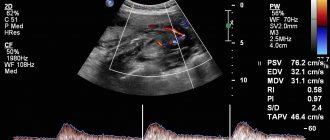Thrombophilia during pregnancy without maintenance therapy and preventive treatment in most cases leads to an unfavorable outcome. Although many modern medical sources call thrombophilia a mild risk factor for pregnancy loss, our experience suggests the opposite. The disease provokes repeated miscarriages, delays in fetal development and even fetal death, and promotes placental abruption. In our clinic, patients with this diagnosis are not uncommon. Our happy mothers tell each other that we carry out a natural birth and, under our supervision, the pregnancy ends with the birth of a healthy baby. Pregnancies with a complicated medical history are managed by the chief physician of the clinic, Marine Isakovna Amyan.
According to statistics, thrombophilia during pregnancy is the cause of recurrent miscarriage in 17% of cases when women come to us with the problem of spontaneous miscarriages. The most dangerous thing in this case is that miscarriages occur during the period of 10-12 weeks, during which time most women are not registered at the antenatal clinic, and some women with irregular cycles may not even know that they are pregnant.
Frequency of testing for detected mutations
A lot depends on the age of the patient. It is the attending physician who determines the time for laboratory and hardware tests. The important points are:
— original background;
— availability of therapy (its results).
Is the diagnosis of thrombophilia accompanied by observation by a hematologist or hemostasiologist?
Diagnosing this disease requires the gynecologist to have certain knowledge and skills related to it. However, in the absence of constant monitoring by a hematologist or hemostasiologist during pregnancy, such consultations are usually not required.
When is screening for genetic thrombophilia required?
This must be done if the following indications are present:
- hereditary predisposition (complex family history - close relatives under 50 years of age suffered from heart attacks, thrombosis, strokes, pulmonary embolism, or died suddenly from unknown causes);
- history of thrombosis;
— undergoing an in vitro fertilization procedure with negative results;
- unfavorable obstetric history in the form of previous diseases (placental abruption, placental insufficiency, fetal growth restriction syndrome, preeclampsia, antenatal death, etc.);
- temporary or permanent increase in the level of homocysteine or antiphospholipid antibodies.
Thrombophilia
The question of thrombophilia in the office of reproductive specialists arises almost daily. We tried to understand this difficult topic with Yulia Alekseevna Kikina
The fact is that now girls are very well-read, literate, they read a lot on forums, and all of them come as one with the question: “do I need to take a blood test for thrombophilia, when to retake D-Dimer, how much Clexane to inject?” People are so frightened by the concept of thrombophilia and afraid of the growth of d-Dimer that they are ready to monitor it almost daily, and all attempts to dissuade them from this are met with hostility.
Therefore, today I will dwell on this problem in more detail and will wait for your questions so that we can resolve everything with you.
At the RAHR scientific conference this year, I met a wonderful hematologist, Maria Alekseevna Vinogradova. She gave us an excellent lecture about thrombophilia, thrombosis and miscarriage, after which I wanted to tell this to everyone, all my colleagues and patients. Its main idea is that examinations should be carried out according to indications (!) and interpreted based on the medical situation, and not just looking at the results of reference values (i.e., differences in the result from normal values), and then therapy will be effective and safe, and the woman will no longer be in constant stress due to fear of growing d-Dimer levels, suffer from bruises from the continuous administration of anticoagulants and spend huge amounts of money on examinations.
So, briefly:
- THROMBOPHILIA IS NOT THROMBOSIS! This is a tendency to form thrombosis under unfavorable conditions, and the doctor’s task is to prevent the creation of these conditions. But this does not mean that a woman should constantly inject heparin drugs in order to “avoid the risk of thrombosis”; this is not justified. Firstly, because thrombophilia in most cases in patients is compensated and the body itself copes with all risks. And secondly, heparin drugs do not have a long-term effect; they only work when you inject them. If you have taken blood tests for thrombophilia, received changes in them (for example, a heterozygous PAI indicator, which happens to most) and decided a month before IVF to start fighting it by daily administration of Clexane or Wessel Due F - you are wasting your time and money ( note, considerable!). If your hemostasis is compensated, as a blood clotting test will tell us, then such prevention will not give you anything other than bruises on your stomach.
- Thrombophilia does not affect the success of IVF. Its impact is mainly associated with the risk of miscarriage.
- D-dimer increases during pregnancy NORMALLY! And it is not a criterion for prescribing anticoagulant therapy, nor is it a parameter that should be monitored during pregnancy. Its control is relevant for those in whom it was elevated before pregnancy. If d-dimer did not increase before pregnancy, there is no reason to worry about its increase during pregnancy.
- Who should be screened for hereditary thrombophilia? For those with a complicated obstetric history:
- 1 or more miscarriages over 10 weeks, provided that genetic causes of miscarriage are excluded;
- stillbirth of an apparently normal fetus, placental abruption in previous pregnancies;
- death of a baby after premature birth;
- severe gestosis (with high blood pressure, convulsions, bleeding disorders);
- delayed fetal development during pregnancy;
- three or more IVF failures.
- Testing for thrombophilia includes:
- antithrombin (it should not be low);
- protein C and protein S (their decrease is also pathological);
- factor V mutation (Leiden);
- prothrombin gene mutation (factor II);
- it is also important to exclude antiphospholipid syndrome (acquired thrombophilia) - antibodies to phospholipids, lupus anticoagulant;
- mixed form of thrombophilia - exclude an increase in homocysteine (it increases with folic acid deficiency).
- The incidence of hereditary thrombophilias and the risk of complications caused by them:
- Antithrombin deficiency occurs in only 0.1% of cases, but a fairly aggressive factor - the risk of complications is up to 50%.
- Deficiency of protein C and protein S - 0.5% - risk up to 10%.
- The heterozygous form of the Leiden mutation (one chromosome is normal, the other is altered) occurs in 4% of cases in the population and leads to complications in 6%.
- The homozygous Leiden mutation is the most dangerous of the thrombophilias; it can lead to miscarriages and thrombosis in 80% of cases. Fortunately, this is a fairly rare form of thrombophilia, only 0.002% in the population.
- Factor II (Prothrombin) in the heterozygous form is not very dangerous (3% occurrence and 3% risk of complications), in the homozygous form it is rare (0.01%), but dangerous for its complications (up to 30%).
- For those who are at risk, the recommended time frame for studying the hemostatic system (blood test for coagulation):
- before the protocol (1–2 days before the start of stimulation);
- 2–3 days before the puncture;
- the day after the puncture;
- 12–14 days after embryo transfer.
During pregnancy, recommended timing of hemostasiogram monitoring:
- 6–8 weeks of pregnancy;
- 12–13 weeks;
- 22–24 weeks (beginning of placental aging);
- 34–36 weeks;
- 2–3 days after birth.
Does genetic thrombophilia affect the characteristics of childbirth?
This pathology is not a reason to choose, for example, a cesarean section. The method of delivery is chosen as in other cases.
Taking tests
The number and time of tests is determined by the gynecologist. The result of donating blood from a vein is usually ready the next day (urgent analysis is available).
The state of the blood coagulation system is assessed by:
- hemostasiogram;
- platelet aggregation;
- D-dimer.
Which medical specialist prescribes the course of treatment?
If the gynecologist is sufficiently qualified, no additional consultations are required for treatment.
Does the gynecologist understand hemostasis?
The medical center employs gynecologists, whose level of qualifications and experience in medical practice undoubtedly meet the necessary requirements.
Treatment and prevention of thrombophilia at Diamed
Thrombophilia during pregnancy can cause miscarriage. But there are a number of other factors that affect normal pregnancy. You can never look at any one disease in isolation. Only an integrated approach and comprehensive constant monitoring can help you fulfill the most important dream of your life - to become parents. Nothing is impossible for medicine; accurate diagnosis and correct effective treatment programs will definitely help you cope with any ailment. The main thing is to come to the doctor, come to our clinic, and expect that your second or third pregnancy will end successfully. With every miscarriage, you lose health and reduce your chances of having a healthy baby.
If you want to get an appointment with Marine Isakovna, call 8 or leave a request in the appointment form on our website, located at the end of the article. You can also choose the clinic closest to you, where you will receive equally qualified assistance:
- Clinic in Mitino
- Clinic in Tekstilshchiki
- Clinic in Maryina Roshcha
Prevention of thrombophilia
- Drink more fluids and avoid dehydration, which can promote blood clots.
- Move every hour, do not sit still for a long time.
- Be careful with medications after pregnancy. Birth control pills or hormone replacement therapy may increase the risk of blood clots.
- Keep your weight normal. Being overweight or obese increases your risk of developing thrombophilia.
- Don't smoke, this will keep your blood vessels healthy.
Source . The article was prepared based on materials provided by obstetrician-gynecologist, candidate of medical sciences, associate professor of the department of postgraduate training at Tula State University Amyan Marine Isakovna. Doctor of the highest category, Excellent healthcare worker, work experience in the specialty since 1994. Published 45 scientific works, including 5 methodological recommendations, 5 educational electronic disks, 4 methodological manuals, 6 educational manuals, 3 analytical reports. Expert on reproductive health of the United Nations Population Fund. ALSO instructor in emergency obstetric care. Evidence-based methodologist medicine.
Types of thrombophilias
The types of disease are presented in the table.
| Type of disease | Causes |
| Acquired | Concomitant diseases - polycythemia, heart disease, taking hormonal drugs, past infections |
| Gennaya | Hereditary pathologies and mutations affecting blood clotting. It occurs at the gene level and is expressed by a congenital increase in blood clotting factors. Often found in close relatives |
| Immune | Autoimmune disorders, in which the mother’s body produces antibodies to her own tissues, and alloimmune, manifested by the production of antibodies to fetal tissues |
| Vascular | Atherosclerosis, vasculitis, varicose veins, diabetic vascular lesions |
| Hemodynamic | Disruption of blood flow through vessels caused by decreased blood pressure and increased blood viscosity |
| Hematogenous | Acquired disorders of the hematocoagulant, anticoagulant and fibrinolytic systems |
The disease can develop in severe form. Most often this happens due to congenital pathologies (for example, a tendency to form blood clots).
Another risk factor is age: in women over 35 years of age who are giving birth for the first time or already have many children, thrombophilia, regardless of the type, develops more severely. Provoking factors can be abortions, severe chronic diseases, and recurrent miscarriages.
Criteria for APS syndrome
Laboratory criteria for antiphospholipid syndrome are the circulation of lupus anticoagulant, quantitative determination of cardiolipin antibodies to beta-2-glycoprotein. And it is extremely important to study twice with an interval of 12 weeks.
Today, 12 weeks of pregnancy is an extremely long period of time to wait for confirmation of the diagnosis of “antiphospholipid syndrome,” especially if the patient has already had miscarriages, and only then decide whether or not to prescribe anticoagulants.
Therefore, in our practice, in such patients, if the presence of a high titer of antibodies to beta-2-glycoprotein or antibodies to other phospholipid cofactors (prothrombin, circulation of lupus anticoagulant, pronounced phenomenon of this anticoagulant) is confirmed, even once, we regard this as antiphospholipid syndrome and immediately begin anticoagulant therapy. Genetic thrombophilia can be very different, depending on its form, we can predict those forms that are characteristic of this thrombophilia and the risk of thrombotic complications.
If we are talking about a deficiency of protein C, protein S, then, as a rule, there are often early losses. However, the genetic form of thrombophilia is more characterized by late losses, when the pregnancy is terminated after 20 weeks of pregnancy.
Why is diagnosing pregnancy complications important?
There is currently no cure for preeclampsia. Therefore, a number of complications require correct diagnosis and prediction of complications and further correct prevention. We can say that it is correct only if we can find out at least proven risk factors.
In patients with thrombophilia, no matter what complications we talk about, be it a severe form of preeclampsia or recurrent miscarriage, because recurrent miscarriage today has received a slightly different name due to the emergence of antiphospholipid syndrome, and this is fetal loss syndrome, which combines various reproductive losses, starting from early stages, ending with late stages and neonatal death, and so on.
Tests for thrombophilia when planning pregnancy
In order to have time to prepare for pregnancy against the background of thrombophilia, it must be identified in time. To do this you need to take tests. The following laboratory tests are used to diagnose pathology:
- General blood analysis. It, among other indicators, determines the number of platelets (blood cells responsible for blood clotting).
- APTT (activated partial thromboplastin time). The indicator reflects the rate of blood clot formation. Its results are non-specific, but provide the doctor with indicative information. In particular, with a decrease in aPTT, hereditary thrombophilia can be suspected.
- Prothrombin time, prothrombin index and international normalized ratio. The results evaluate the effectiveness of several blood clotting factors.
- Thrombin time. Evaluates the rate of conversion of fibrinogen to fibrin. With thrombophilia, a shortening of TV is possible.
Other studies that may be prescribed if pathological results of a coagulogram are received:
- fibrinogen;
- antithrombin II;
- I Hageman-dependent fibrinolysis;
- D-dimer;
- platelet aggregation;
- protein C;
- lupus anticoagulant.
PCR testing can be used to identify mutations in genes that lead to thrombophilia.
Not everyone gets tested for thrombophilia. Typically, diagnosis is made when there are abnormalities in the coagulogram, as well as in the case of a burdened obstetric history. The main indications for in-depth study of the blood coagulation system:
- history of spontaneous abortions;
- stillbirth;
- three or more unsuccessful IVF attempts;
- severe gestosis or intrauterine growth retardation in the anamnesis.










